Overview
The article titled "10 Essential MCHAT Questions Every Parent Should Know" highlights the vital role of the Modified Checklist for Autism in Toddlers (M-CHAT) as a screening tool for the early detection of autism spectrum disorder (ASD) in children. Understanding and utilizing key M-CHAT questions can empower parents, helping them assess their child's developmental progress. This proactive approach is essential, as seeking timely interventions can make a significant difference in improving outcomes for children at risk for ASD.
Navigating the world of autism screening can feel overwhelming, but knowing the right questions to ask is a powerful first step. Parents often share their experiences of uncertainty and concern when it comes to their child's development. By familiarizing themselves with M-CHAT, they can feel more equipped to address their child's needs and advocate for appropriate support.
Ultimately, this knowledge not only fosters confidence in parents but also opens the door to valuable resources and interventions. Every child deserves the best possible start, and being informed allows parents to take action that can lead to positive changes in their child's life.
Introduction
In the journey to support children with autism, the significance of early detection is paramount. The Modified Checklist for Autism in Toddlers (M-CHAT) stands out as an essential resource, providing parents with a straightforward way to evaluate their child's developmental behaviors and pinpoint potential risks for autism spectrum disorder.
As autism diagnoses continue to increase, comprehending the subtleties of M-CHAT results can empower parents to pursue timely interventions that profoundly impact their child's developmental path. This article explores the vital components of the M-CHAT, from its key questions to the necessary follow-up procedures, illustrating how informed actions can unlock the full potential of children at risk for autism.
By fostering a collaborative approach that includes healthcare professionals and educators, families can cultivate a nurturing environment that promotes growth and development, ensuring that every child has the opportunity to thrive.
About ASD Media: Empowering Parents with Essential Autism Resources
At ASD Media, we are deeply committed to enhancing the implementation of ABA therapy, providing vital insights and strategies that tackle challenges and improve outcomes for families. Our organization offers a wide range of resources tailored for caregivers and professionals, fostering a supportive and inclusive community where experiences can be shared, and learning is encouraged. For instance, Lisa, a guardian of a five-year-old with ADHD, has found that the support from ASD Media has significantly improved her child's quality of life. By subscribing to our newsletter, you can gain access to the latest news and unlimited digital resources, empowering you to unlock the potential of youth with autism and ADHD. This initiative holds great importance, as research indicates that effective ABA therapy can lead to substantial improvements in the quality of life for children, with many caregivers reporting increased satisfaction in their daily routines.
Our mission at ASD Media is to equip parents and professionals with effective strategies for managing challenging behaviors, navigating assistance services, and developing essential social skills. We also highlight the importance of community support, as evidenced by recent advocacy efforts aimed at establishing an Autism Commissioner to ensure the rights and needs of autistic individuals and their families are addressed. As noted in the case study titled 'Future Vision for Autism Rights,' such advocacy resonates with our commitment to fostering a collaborative environment. Additionally, the quote, 'The role of integration in creating and then safeguarding authentic relationships within the community is of fundamental importance,' underscores the value of community support in achieving these objectives.
Through these efforts, ASD Media not only provides essential resources but also nurtures a collaborative atmosphere that promotes growth and success in the field of ABA therapy. Julie's heartfelt expression of gratitude for Auriga's assistance illustrates how community involvement can alleviate burdens for caregivers, further demonstrating the impact of our resources. This comprehensive approach ensures that parents are not only informed but also equipped with practical advice to effectively support their children.
M-CHAT: Key Questions for Early Autism Screening
The Modified Checklist for Autism in Toddlers (M-CHAT) is an essential screening tool that consists of 20 focused questions designed to assess a child's risk for autism spectrum disorder (ASD). This simple yes/no questionnaire emphasizes critical behaviors related to social interaction, communication, and play, making it accessible for families navigating this important aspect of their child's development. Key questions evaluate whether the child makes eye contact, responds to their name, and shows interest in peers—vital indicators of developmental progress.
Recent studies reveal that the M-CHAT/F detected only about 40% of youths later diagnosed with ASD, highlighting the urgent need for early screening. Findings from a large-scale study conducted by the Children’s Hospital of Philadelphia underscore the tool's potential to facilitate timely diagnoses and interventions. As the incidence of autism spectrum disorder continues to rise, with recent estimates indicating that around 1 in 36 children receive a diagnosis of ASD, this screening tool remains a crucial resource in pediatric practices.
As we look ahead to 2025, the relevance of the M-CHAT persists, with ongoing research focused on enhancing its effectiveness and understanding its long-term benefits. This research is vital for shaping current practices and expectations surrounding the screening tool. Pediatricians stress the importance of early autism screening, advocating for universal implementation to bridge gaps in access and outcomes across different demographic groups. As Heidi Feldman, professor and head of the Division of Developmental-Behavioral Pediatrics, wisely states, "It is crucial for clinicians to think carefully about the results of the screening test, to neither unnecessarily worry guardians nor to inaccurately assure them."
By utilizing this assessment tool, guardians can actively engage in observing their child's development and pursue appropriate support when needed.
Key Behaviors Assessed by M-CHAT:
- Eye contact
- Response to name
- Interest in peers
- Engagement in play
- Social interaction
Understanding these behaviors empowers parents to better assess their child's developmental progress and seek timely interventions.
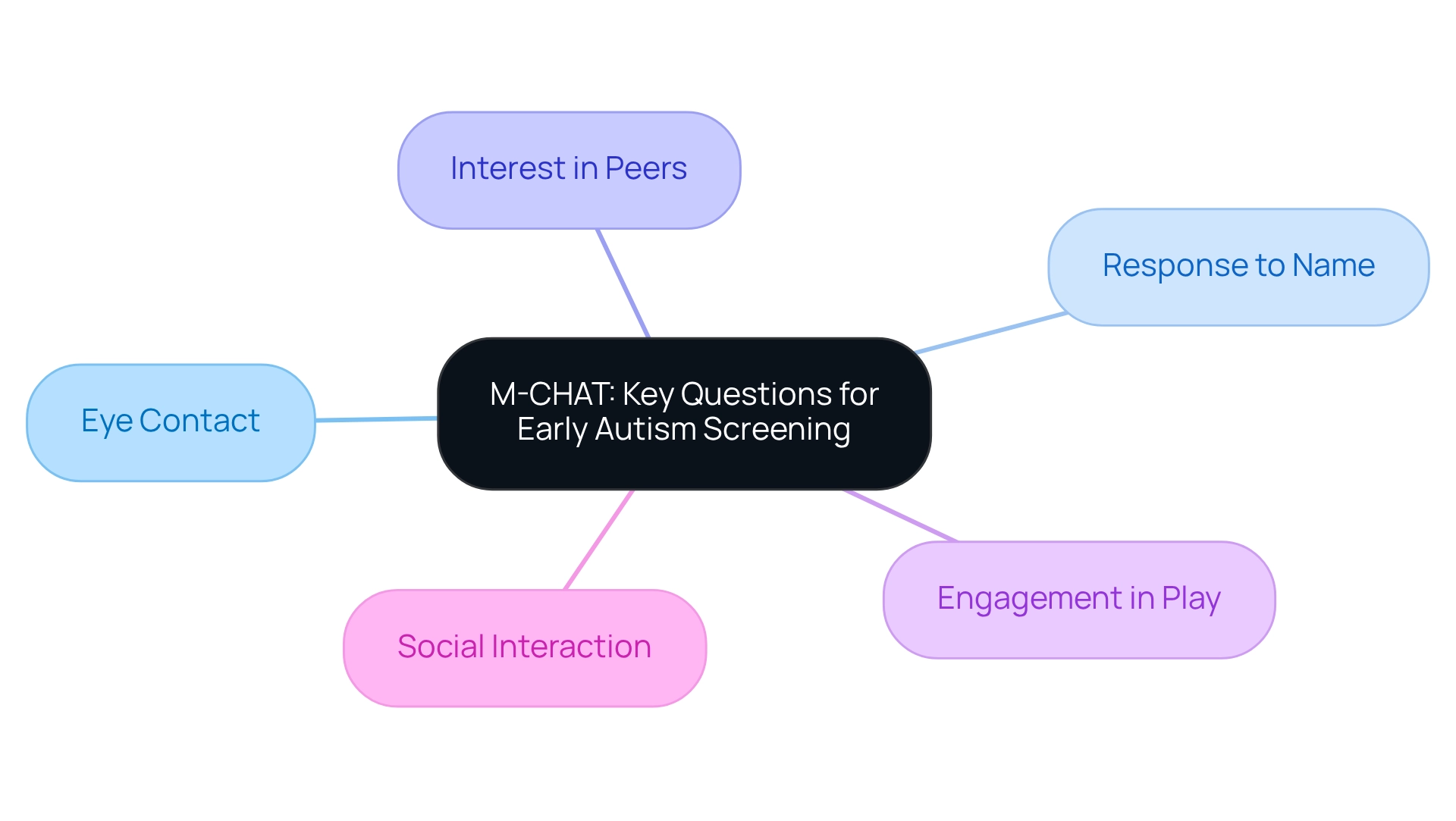
Importance of Early Screening: Why M-CHAT Questions Matter
Early screening for autism is incredibly important, as it allows for timely intervention that can greatly enhance a young person's developmental journey. The Modified Checklist for Autism in Toddlers, which utilizes mchat questions, is a vital tool for identifying children at risk for Autism Spectrum Disorder (ASD), empowering parents to seek further assessment and support. Statistics reveal that children who receive timely intervention after screening show significantly better outcomes; research indicates that early diagnosis can foster improved social, communication, and behavioral skills.
For instance, a recent initiative called Autism Eyes aims to diagnose autism 1 to 3 years earlier by examining a child's gaze and eye movement. However, it's crucial to remember that Autism Eyes is still under development and not yet available for clinical application, highlighting the ongoing need for established tools such as mchat questions. Experts emphasize that early intervention not only enhances developmental results but also leverages the brain's plasticity, which is particularly beneficial for individuals diagnosed with autism.
Erin Andres, a postdoctoral fellow at the University of Missouri, expressed her support for this research, saying, "They are glad to see that we are researching this topic, and they are very interested in these infant characteristics being measured earlier, too." By recognizing the importance of these questions, caregivers can take proactive steps to support their children's growth and help them reach their full potential.
To maximize the benefits of the screening tool, caregivers should:
- Familiarize themselves with the mchat questions
- Seek further assessment if they have concerns about their child's development
Your involvement can make a significant difference in your child's life.
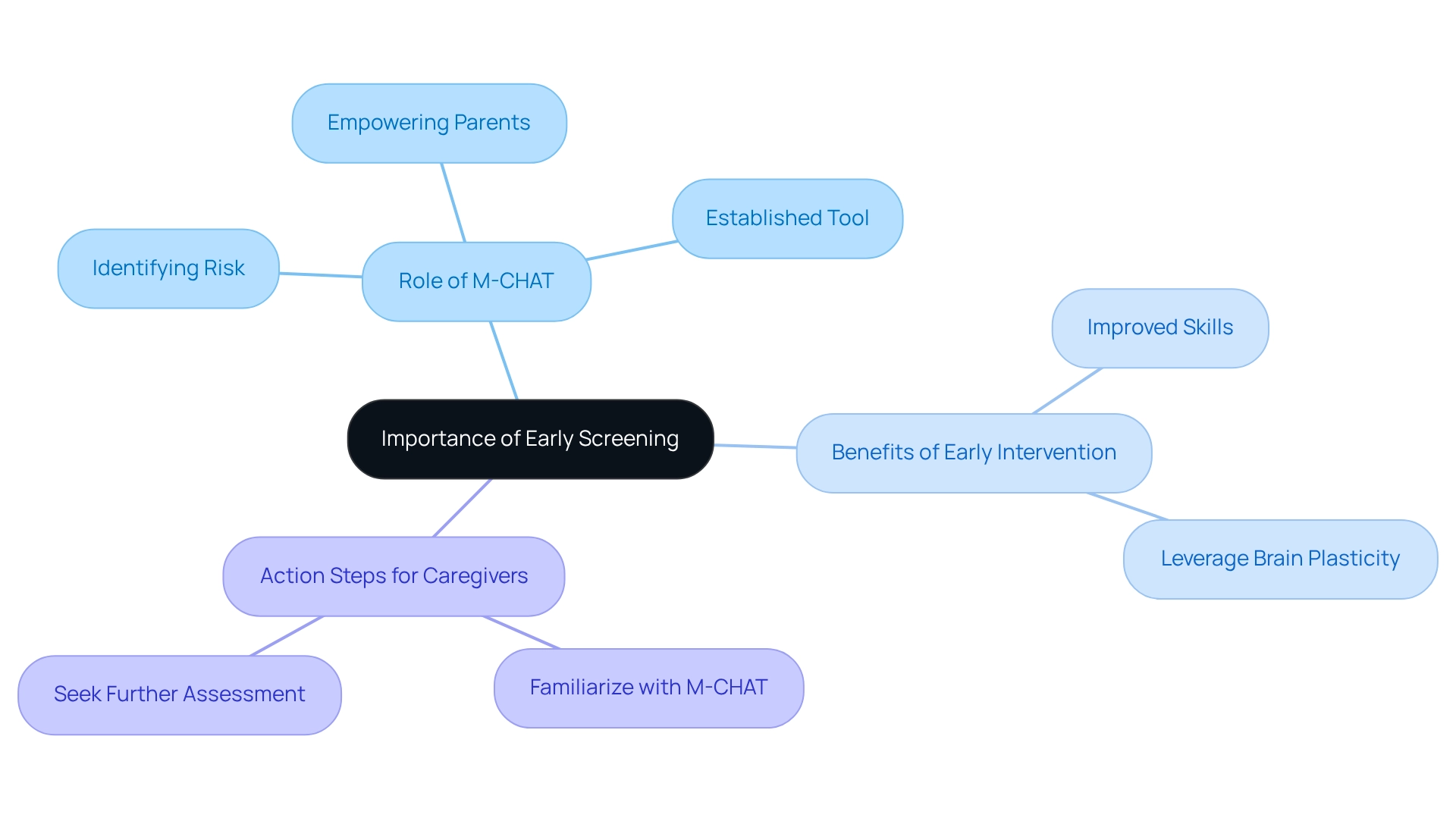
Key Features of M-CHAT: What Parents Need to Know
The M-CHAT (Modified Checklist for Autism in Toddlers) is a valuable tool designed to help parents assess their child's typical behaviors using 20 M-CHAT questions. Aimed at children aged 16 to 30 months, it serves as an essential resource for early identification of autism. These M-CHAT questions delve into various behavioral domains, such as social interaction, communication skills, and play patterns, providing a holistic view of a child's development. What makes the M-CHAT particularly user-friendly is that it can be completed in about 10 minutes, allowing parents to receive prompt feedback on their child's risk level for autism. Pediatricians emphasize the importance of closely monitoring children who receive unfavorable screening results. Continuous observation can reveal signs of autism that may not be immediately apparent, creating an opportunity for early intervention.
As noted by Pandey et al., 'In general, it performs well at both 18- and 24-months but with some increased predictive ability at 24 months.' This highlights the proactive approach that the M-CHAT encourages; its enhanced predictive accuracy at 24 months makes it an important resource for early intervention.
If concerns persist after a negative screening result, parents are encouraged to advocate for further screening or seek a second opinion. This ensures that their child's developmental needs are fully addressed, reinforcing the idea that every child deserves the best support possible.
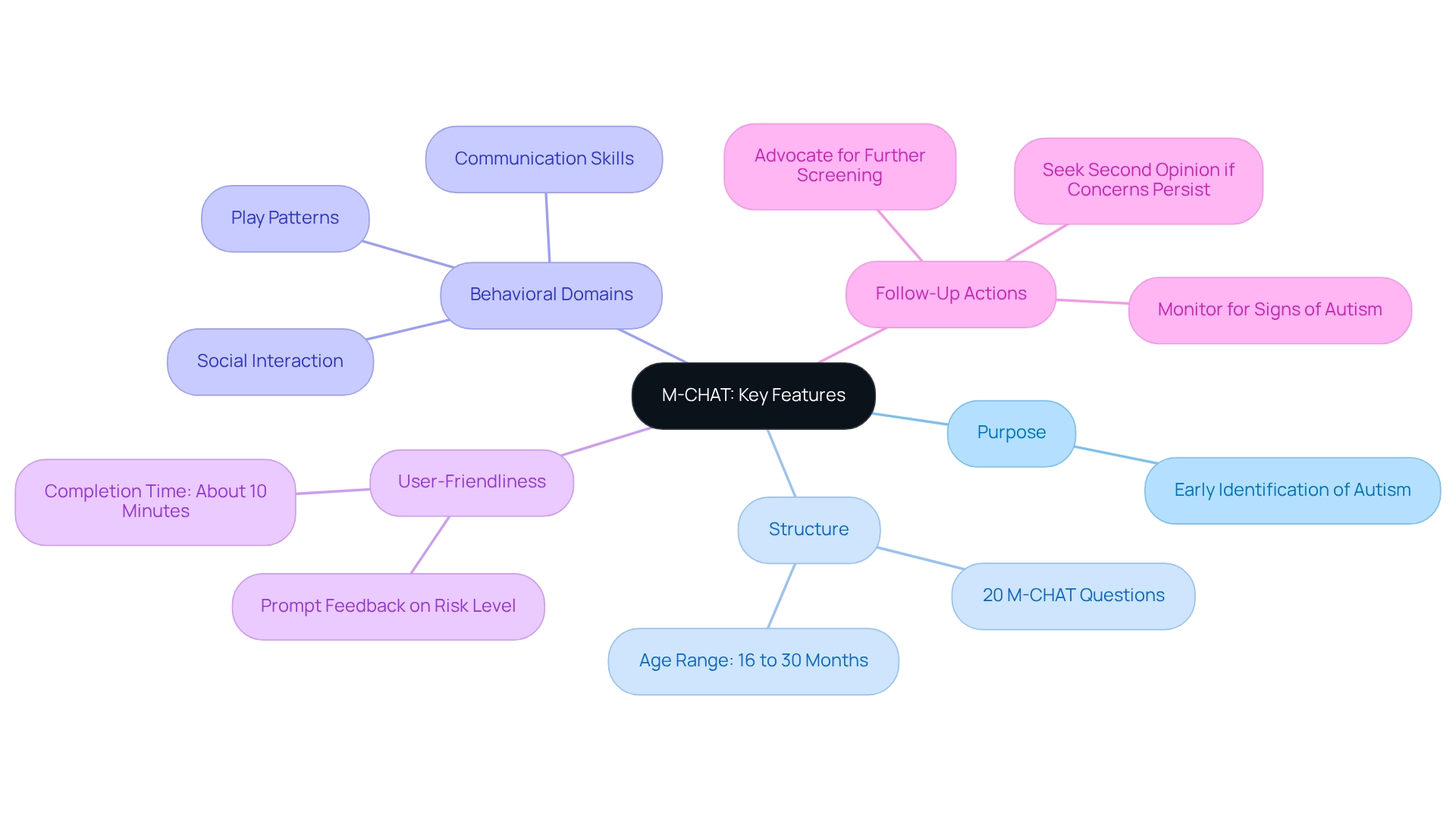
M-CHAT Scoring: Interpreting Your Child's Results
Evaluating the screening tool is a straightforward procedure, where each question is answered with a simple 'yes' or 'no.' These responses are then tallied to determine the risk level for autism. A score of 0-2 suggests a low likelihood of autism, while scores from 3 to 7 indicate moderate risk, signaling the need for further evaluation. Importantly, a score of 7 serves as a clinical cutoff for immediate referral to evaluation and intervention, effectively identifying nearly all screen-positive cases. A score of 8 or higher points to a high risk for autism, prompting urgent follow-up with a healthcare professional.
Understanding these scores is crucial for caregivers, as they guide the next steps in seeking assistance and intervention. For instance, a comprehensive study involving a large, geographically diverse pediatric group found that 54% of youth who screened positive using the tool were ultimately diagnosed with ASD, and 98% showed significant developmental concerns. This highlights the tool's effectiveness in recognizing at-risk youth and underscores the importance of prompt follow-up actions by guardians based on these findings.
Parents should be mindful of the implications of their child’s mchat questions. If a young person scores in the moderate risk range on the mchat questions, guardians might consider discussing the results with a healthcare provider to explore further assessments or interventions. As Diana L. Robins wisely advises, "If you are opting to have them take the checklist home, make sure to come to an agreement as to when they should submit a fully-accomplished checklist to you." Engaging proactively with specialists can lead to improved outcomes for youth identified as at risk. By carefully analyzing these assessment scores, caregivers can make informed decisions that help unlock their child's potential.
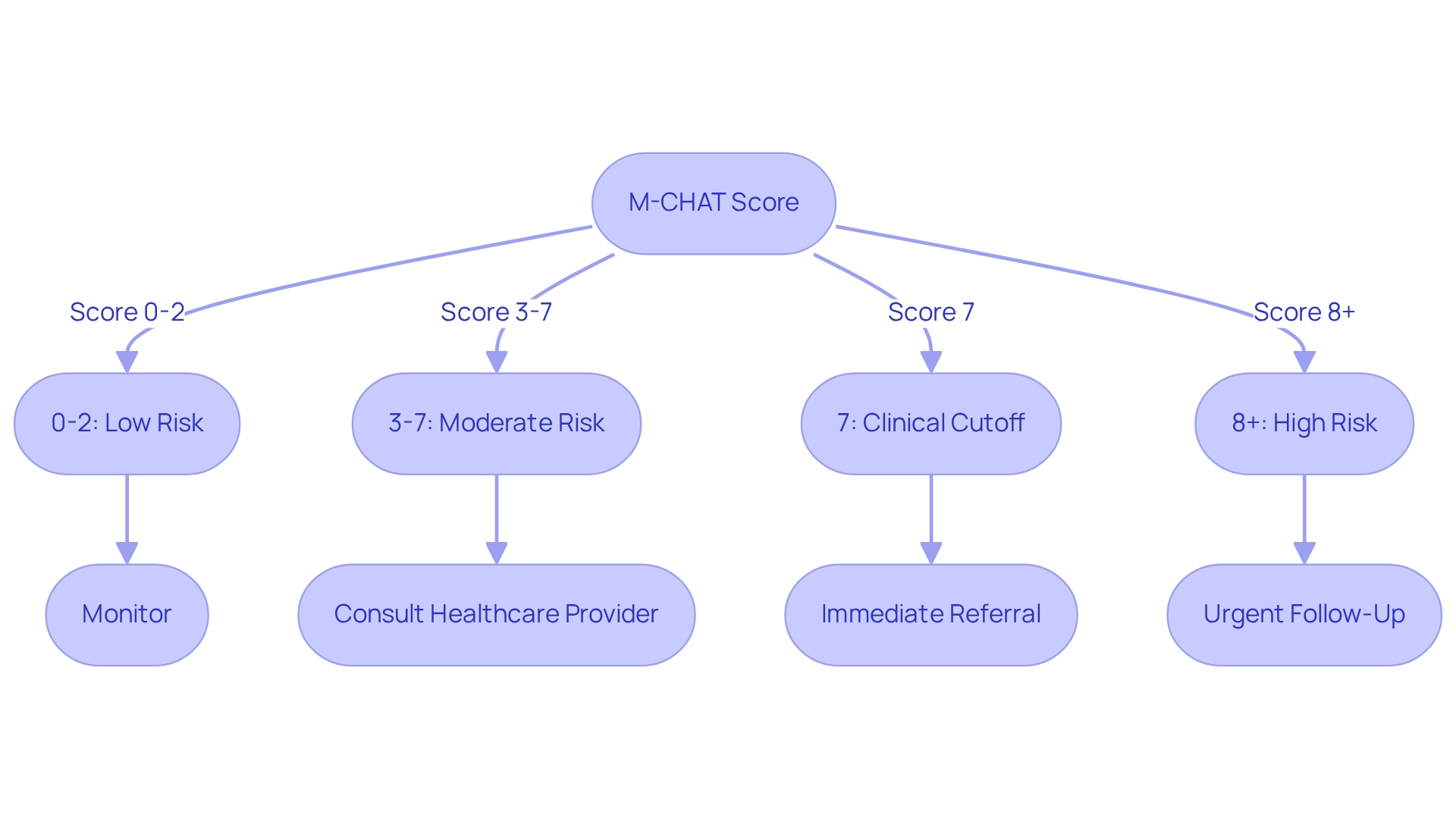
Follow-Up Procedures: Next Steps After M-CHAT Screening
After completing the assessment, it is crucial for parents to engage in a meaningful conversation about the findings with their pediatrician or a qualified healthcare professional. If the assessment score suggests a moderate to high risk for autism, a comprehensive evaluation becomes essential. This evaluation typically includes various assessments, such as developmental history reviews and potential referrals to specialists. Research indicates that many youths who initially screen positive for autistic traits may not receive a diagnosis upon further assessment, underscoring the importance of thorough follow-up procedures.
Alarmingly, about 60% of parents do not pursue follow-up consultations after screening, which can significantly hinder timely intervention. Prioritizing early intervention services is vital, as they play a crucial role in supporting youth identified as at risk for autism. Specialists emphasize that discussing the assessment results with medical professionals is a key step in ensuring that young individuals receive the necessary assistance and resources.
As highlighted in the case study 'Challenges in Autism Screening and Diagnosis,' relying solely on screening tools can lead to misdiagnoses, reinforcing the need for comprehensive evaluations. Following the assessment results, thorough evaluations may involve behavioral assessments, cognitive testing, and input from multidisciplinary teams, all aimed at accurately determining the individual's needs and facilitating appropriate interventions.
As ASD Media supports families throughout every stage of the evaluation and intervention process, it is essential for guardians to take proactive steps in following up on the results. As Kate Wallis, MD, MPH, stated, 'This study revealed important limitations and provides us with new knowledge that we can use to make critical improvements to autism screening tools and screening processes, so pediatricians can properly detect and support more individuals with autism and reduce disparities in diagnosis and care.
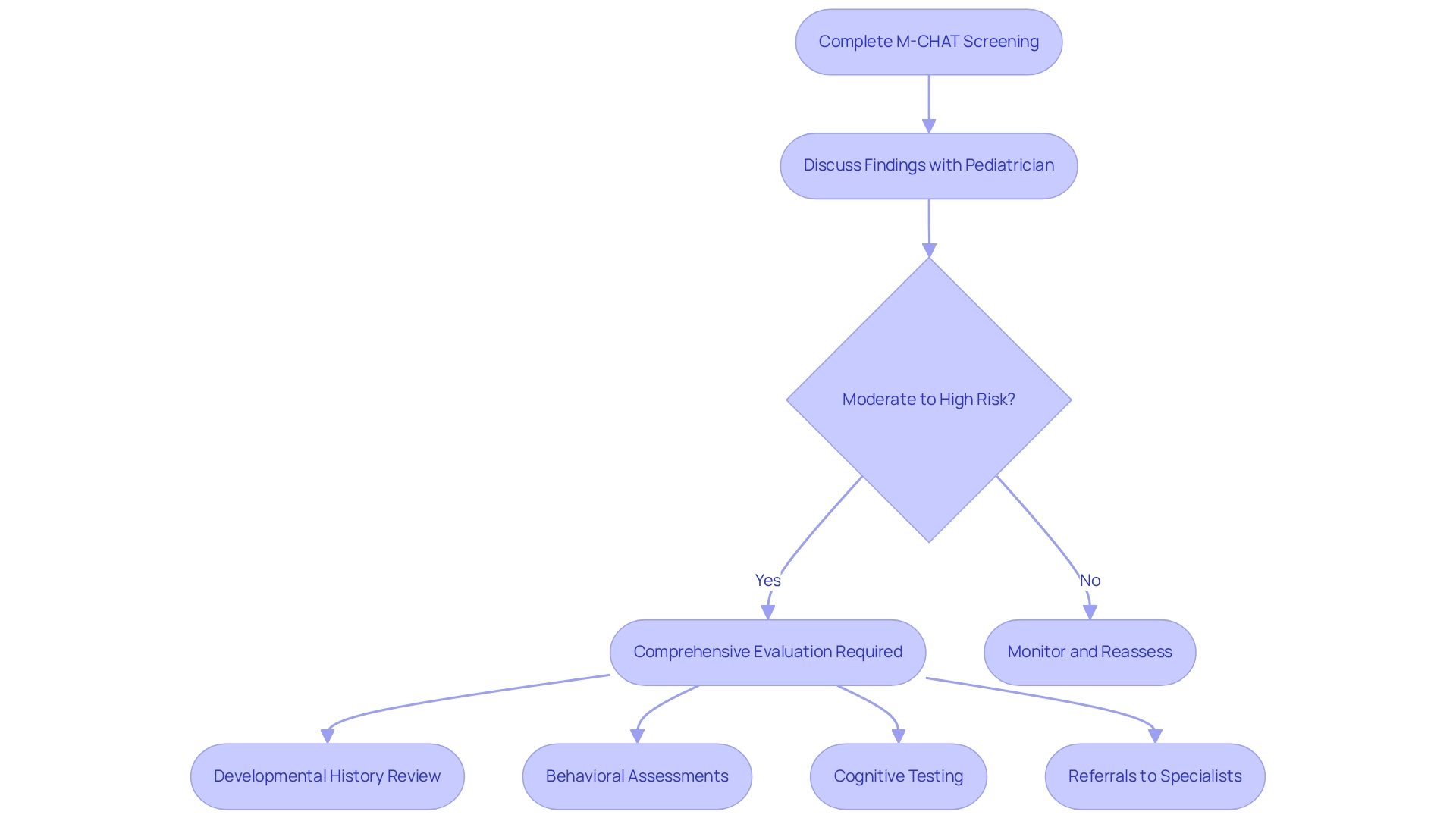
Understanding M-CHAT Results: What They Mean for Your Child
Understanding the mchat questions is vital for parents navigating their child's developmental path. A low score on mchat questions can be reassuring, suggesting typical development, while a moderate or high score may raise concerns. If your child scores in the moderate range, there’s no need to panic. Instead, view it as a valuable opportunity for further assessment and support. Engaging with healthcare professionals can illuminate the next steps in your child's journey, providing clarity and direction. Remember, you are not alone in this; many parents share similar experiences, and seeking help is a proactive step towards ensuring your child's well-being.
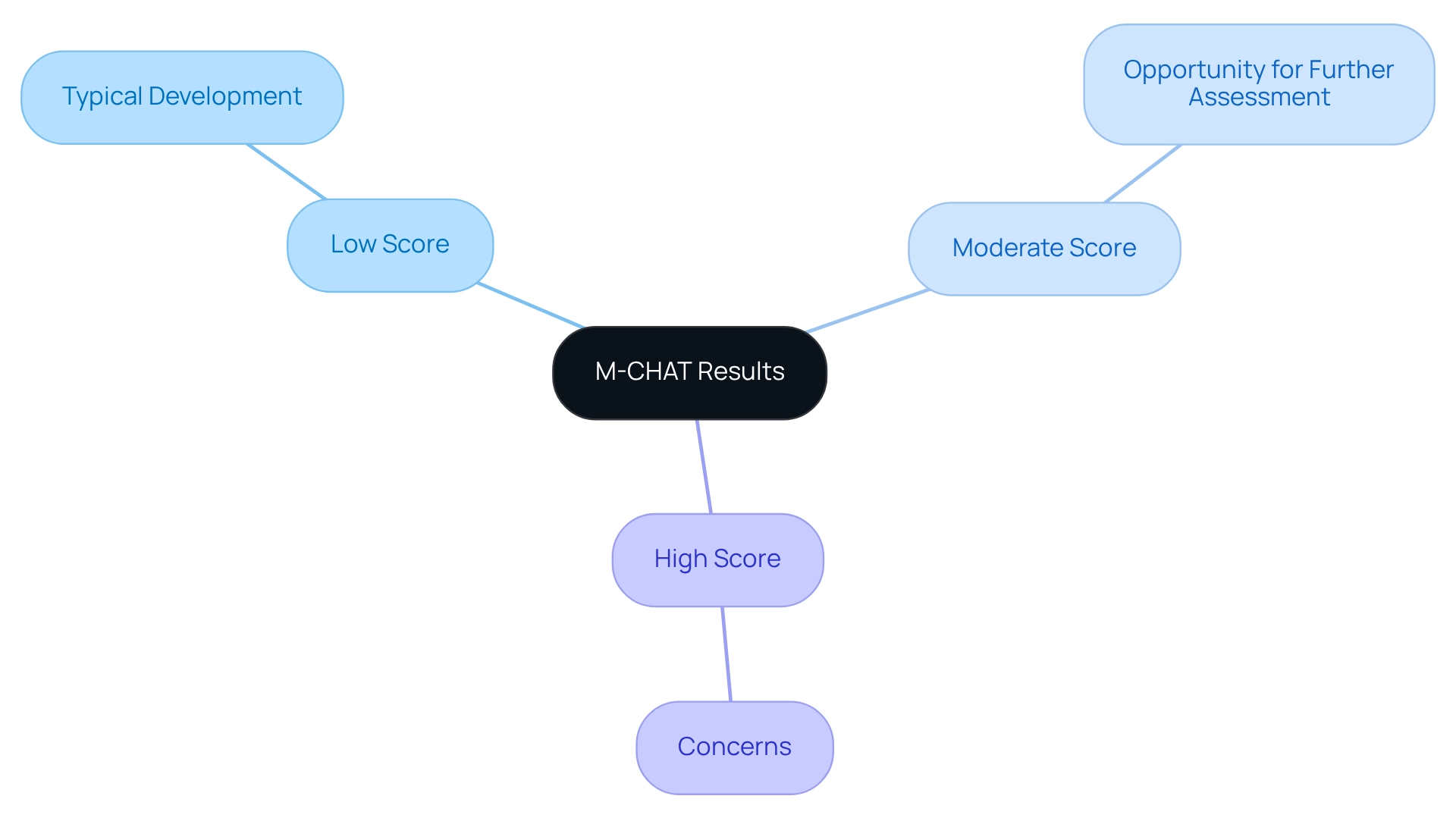
Professional Evaluation: Collaborating with Experts After M-CHAT
When the mchat questions suggest the need for further evaluation, it is vital for guardians to pursue a professional assessment from qualified specialists, such as pediatricians, psychologists, or developmental experts. These professionals conduct comprehensive evaluations that may encompass standardized tests, observational assessments, and in-depth interviews with guardians. The collaboration between parents and these experts is essential for crafting an effective intervention plan tailored to the individual’s unique needs.
Research shows that enhancing the availability of ASD diagnostic providers is crucial for ensuring timely evaluations. Family physicians often hesitate to administer the mchat questions compared to pediatricians, highlighting the necessity of engaging with specialists who are experienced in autism assessments.
For example, case studies illustrate how collaborative efforts can significantly improve outcomes. In one notable instance, a young individual supported at John Cabot House was able to relearn playing the piano and take up the cello, thanks to the dedicated assistance from her team. This underscores how a well-coordinated approach among parents and specialists can empower young individuals to thrive. As Lauren, an individual supported at Devonshire House, shared, "The help I received made a significant difference in my journey, aiding me in regaining my confidence and skills."
Expert opinions consistently emphasize the pivotal role professionals play in the autism evaluation process. Their insights not only guide the evaluation but also inform the development of tailored intervention strategies that address the specific challenges faced by each individual. By fostering strong partnerships with experts, caregivers can ensure that their children receive the comprehensive support necessary for their growth and development.
As a next step, guardians are encouraged to actively seek out specialists who can provide the necessary evaluations and support. Being well-informed and prepared to advocate for their children’s needs is key to navigating this journey.
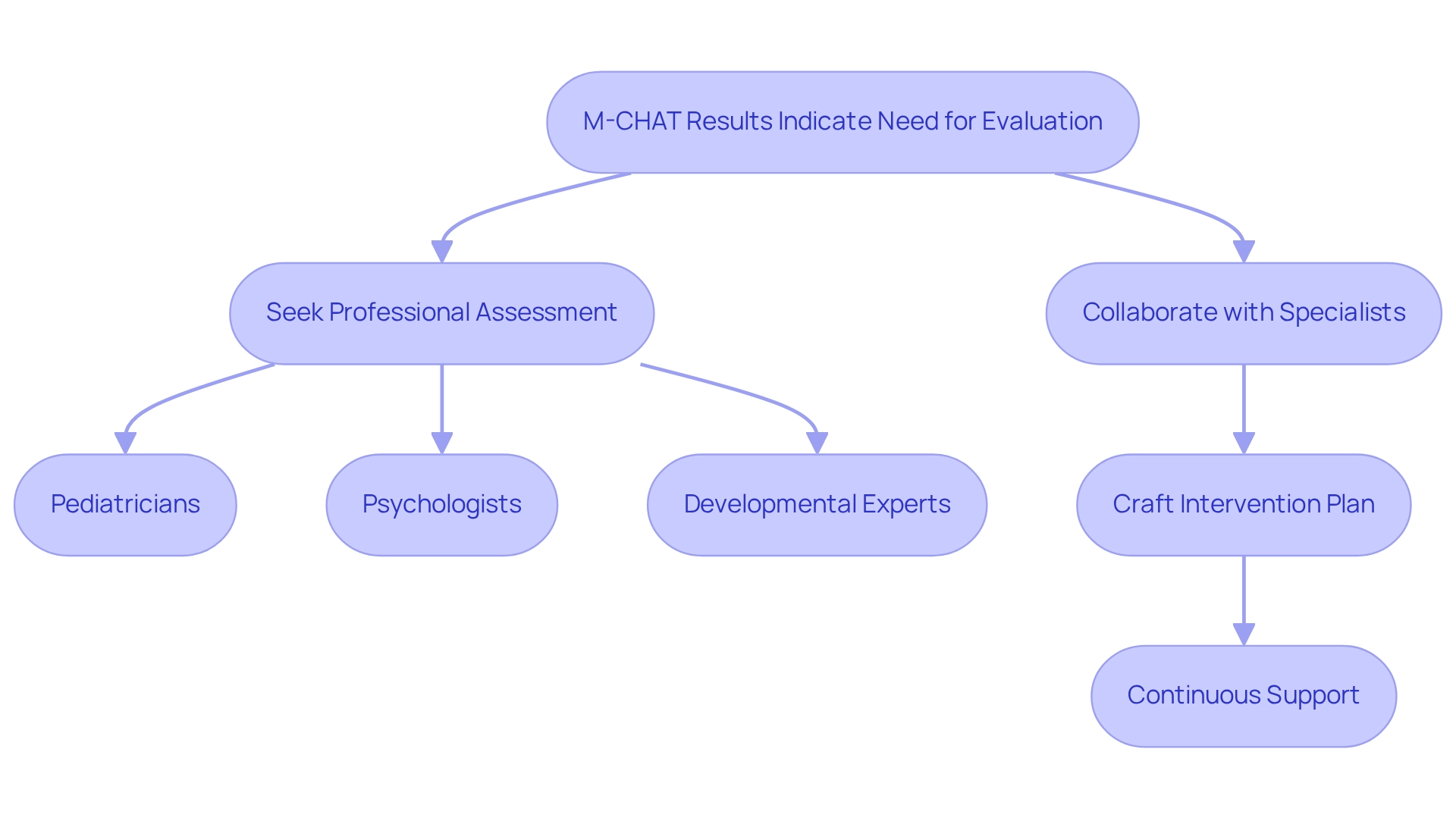
Collaborative Approach: Working with Professionals for Better Outcomes
A collaborative method that involves parents, healthcare professionals, and educators is essential for enhancing outcomes for youth with autism. This partnership fosters the exchange of insights, strategies, and resources vital for the young person's development. Regular interaction and collaboration among these stakeholders ensure that care is consistent and comprehensive, effectively addressing the needs of the young one across various environments.
Research shows that strong support networks significantly improve the well-being of autistic individuals. Alarmingly, studies reveal that between 33% and 59% of mothers experience considerable depressive symptoms following their child's ASD diagnosis, underscoring the necessity for cooperative assistance to alleviate such challenges.
Initiatives like the Autism Awareness Centre, founded by Maureen Bennie in 2003, exemplify successful partnerships aimed at advocacy and education, fostering positive change in the lives of those affected by autism. By working together, guardians, healthcare professionals, and educators can create a nurturing atmosphere that not only addresses immediate concerns but also promotes long-term growth and development for individuals with autism.
As Sean aptly noted, "they want everyone to feel comfortable enough to make mistakes and say the wrong thing because they believe that if everyone is too nervous to say or do anything then nothing changes."
To enhance collaboration, guardians can initiate regular meetings with educators and healthcare providers to discuss their child's progress and share insights, ensuring a unified approach to care.
Comprehensive Autism Care: Integrating M-CHAT into Your Support Strategy
Incorporating the screening tool into a thorough autism care approach is crucial for promoting long-term success in youth with autism. Imagine the peace of mind that comes when parents have the right resources at their fingertips. The screening outcomes should serve as a vital resource for ongoing support, encouraging parents to view the assessment within a broader context that encompasses:
- Routine developmental evaluations
- Early intervention services
- Collaboration with educational experts
This holistic approach not only addresses immediate developmental challenges but also nurtures the overall well-being and success of the young individual.
Research shows that children receiving comprehensive support after screening experience significantly improved long-term outcomes. This highlights the importance of continuous involvement and tailored care strategies. Experts advocate for ongoing assistance, emphasizing that the integration of M-CHAT questions into a holistic strategy can lead to more effective management of autism-related challenges and enhance social skills development. As RM noted, "Comprehensive care strategies are essential for addressing the multifaceted needs of youths with autism."
By prioritizing a collaborative approach, parents can ensure that every facet of their child's development is nurtured, ultimately unlocking their full potential. Furthermore, with the recent proposal of $9 billion for the CCDBG and $13.1 billion for Head Start in President Biden's FY 2024 budget, it is vital to advocate for sufficient funding to support these comprehensive care strategies. This ensures that all children have access to the resources they need, paving the way for a brighter future.
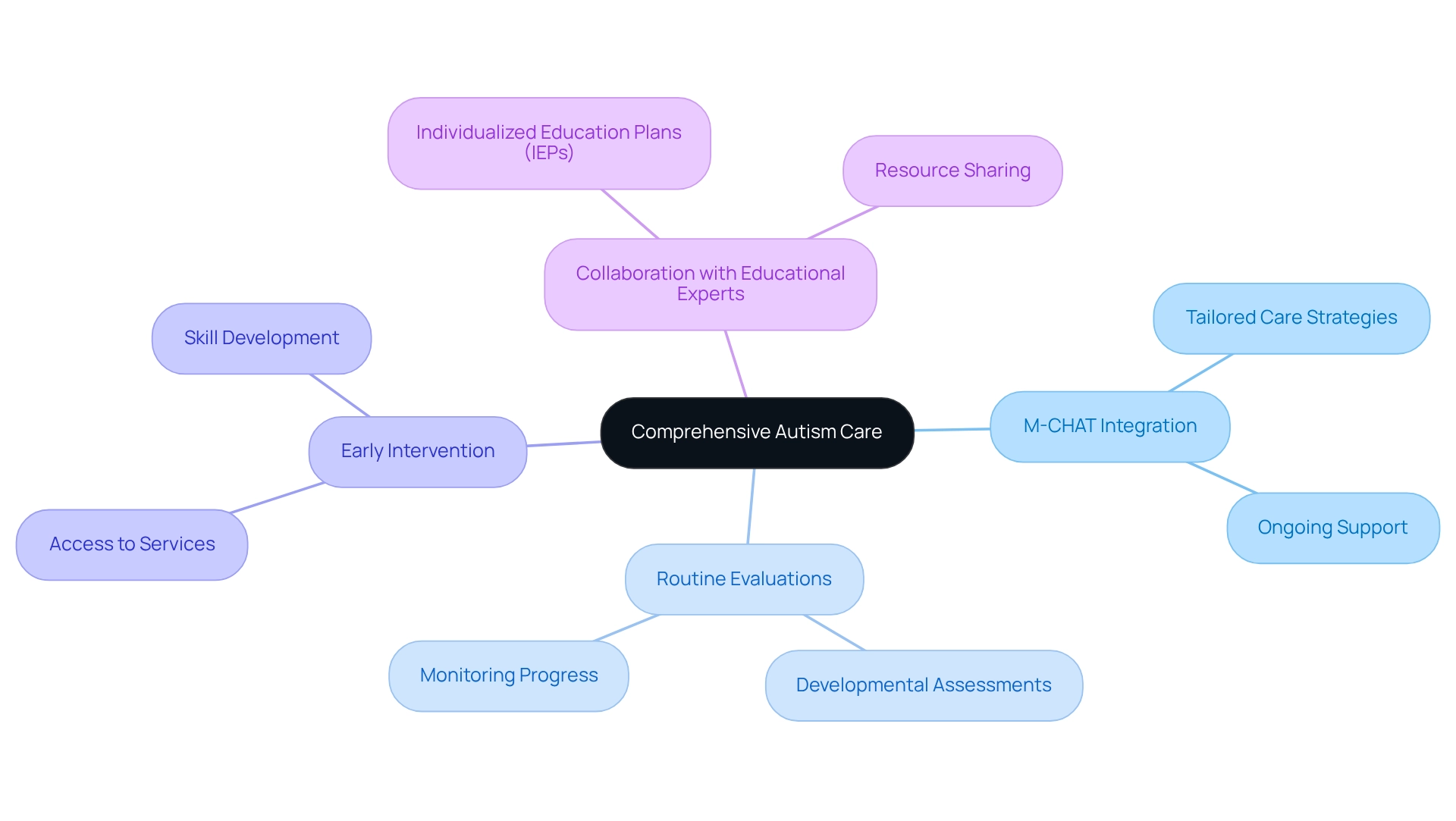
Conclusion
Supporting children with autism begins with the essential step of early detection, and the Modified Checklist for Autism in Toddlers (M-CHAT) is crucial in this journey. By offering a simple set of questions to assess key developmental behaviors, the M-CHAT empowers parents to recognize potential risks and seek timely interventions. The significance of early screening cannot be overstated; research consistently shows that early diagnosis and intervention lead to markedly better outcomes in social, communication, and behavioral skills.
However, the journey does not end with the M-CHAT's completion. Parents are encouraged to engage in meaningful discussions with healthcare professionals to accurately interpret results and pursue necessary follow-up evaluations. This collaborative approach, involving parents, healthcare providers, and educators, is vital for creating a supportive environment that addresses the diverse needs of children diagnosed with autism. By fostering strong partnerships, families can ensure that their children receive the comprehensive care and resources essential for their development.
Ultimately, equipping parents with knowledge about the M-CHAT and its implications lays the groundwork for a proactive approach to autism care. Integrating M-CHAT results into a broader support strategy enhances the potential for long-term success and well-being. As awareness and advocacy efforts continue to grow, it is crucial for communities to prioritize access to resources and funding that support families navigating the complexities of autism. Through informed action and collaboration, every child at risk for autism can be given the opportunity to thrive.
Frequently Asked Questions
What is the mission of ASD Media?
The mission of ASD Media is to enhance the implementation of ABA therapy by providing insights and strategies that improve outcomes for families, equipping parents and professionals with effective strategies for managing challenging behaviors, navigating assistance services, and developing essential social skills.
How does ASD Media support caregivers and professionals?
ASD Media offers a wide range of resources tailored for caregivers and professionals, fostering a supportive community where experiences can be shared, and learning is encouraged. This includes access to the latest news and unlimited digital resources through their newsletter.
What impact has ASD Media had on families?
Families, such as Lisa, a guardian of a child with ADHD, have reported significant improvements in their child's quality of life due to the support and resources provided by ASD Media.
Why is community support important according to ASD Media?
Community support is vital as it helps address the rights and needs of autistic individuals and their families. Advocacy efforts, such as establishing an Autism Commissioner, highlight the importance of a collaborative environment for achieving these objectives.
What is the Modified Checklist for Autism in Toddlers (M-CHAT)?
The M-CHAT is a screening tool consisting of 20 focused yes/no questions designed to assess a child's risk for autism spectrum disorder (ASD), focusing on critical behaviors related to social interaction, communication, and play.
What key behaviors does the M-CHAT assess?
The M-CHAT assesses behaviors such as eye contact, response to name, interest in peers, engagement in play, and social interaction.
How effective is the M-CHAT in detecting autism?
Recent studies indicate that the M-CHAT detects only about 40% of youths later diagnosed with ASD, emphasizing the need for early screening and timely interventions.
What are the benefits of early autism screening?
Early autism screening allows for timely interventions that can significantly enhance a young person's developmental journey, leading to improved social, communication, and behavioral skills.
What steps should caregivers take to maximize the benefits of the M-CHAT?
Caregivers should familiarize themselves with the M-CHAT questions and seek further assessment if they have concerns about their child's development.
What ongoing research is being conducted regarding autism screening?
Ongoing research is focused on enhancing the effectiveness of the M-CHAT and understanding its long-term benefits, as well as exploring new initiatives like Autism Eyes, which aims to diagnose autism earlier.




